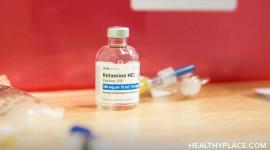Treatment Options for Treatment Resistant Depression

Many people with treatment-resistant depression (TRD) feel that their options are limited or even non-existent. Today, however, there are many alternative approaches to treating TRD that can help ease the symptoms of major depressive disorder and improve patient outcomes. In March 2019, a new nasal spray medication was approved by the FDA to work alongside oral antidepressants for sufferers of depression who have failed to respond to conventional treatments. This is a significant breakthrough in the mental health field, but it's not the only treatment option for treatment-resistant depression.
Treatment-Resistant Depression: Am I Out of Options?
When it comes to treatment-resistant depression, it can seem like you're out of options, but this is rarely the case. Being diagnosed with TRD can feel hopeless, but it’s important to gain some perspective before you write off all possible treatments.
Firstly, treatment-resistant depression affects around one-third of all patients treated for major depressive disorder, so it is more common than you might think. Secondly, the term "treatment-resistant" doesn't mean you'll never respond to treatment; this is merely the label given to depression that doesn't improve after two or more antidepressant medications are tried.
Having treatment-resistant depression means that you and your doctor may need to work a bit harder to find ways of managing depression that work for you. There is no quick fix, but there are plenty of options to try – even if you have recurring major depressive disorder (MDD).
Treatment-Resistant Depression: Options to Ask Your Doctor About
The options for the treatment of treatment-resistant depression include:
Making changes to your medication: It may be that you need to try a new medication for treatment-resistant depression, or that you need to increase your current dose. Your doctor might suggest a different type of antidepressant or consider tweaking your drug schedule before exploring other treatment-resistant depression options.
Psychological counseling: Most patients with moderate to major depression see a counselor, and many find it to be instrumental in managing their depression symptoms. Some people are reluctant to try counseling, or else they think that because they've attempted one form of counseling without success that it doesn't work for them. Of course, talking therapy may not work for everyone, but it is a vital part of treatment in most cases.
Testing for other health conditions: Depression can be caused or worsened by underlying health conditions like thyroid problems, eating disorders or chronic fatigue syndrome. In rare cases, it can also be linked to heart disease or certain types of cancer. As a result, your doctor may decide to run other tests before diagnosing you with treatment-resistant depression.
Electro-convulsive therapy (ECT): ECT for treatment-resistant depression is often used to treat life-threatening or severe cases of depression, mania or psychosis. The treatment involves an electric current being sent through the brain to trigger a seizure. It is given under general anesthetic using muscle relaxants, so your body only twitches slightly rather than convulsing. In a survey of 78 ECT clinics conducted in 2012-2013, the ECT Accreditation Service reported the procedure to be effective or highly effective in 1712 out of 1789 patients.
Transcranial magnetic stimulation (TMS): Transcranial magnetic stimulation (TMS) is a non-invasive procedure that uses magnetic fields to stimulate nerve cells to improve symptoms of depression. TMS for treatment-resistant depression has proven efficacy in adult, pediatric and geriatric patients.
New medication for treatment-resistant depression: In March 2019, the FDA approved a new esketamine nasal spray named Spravato for treatment-resistant depression, which can be taken alongside oral antidepressants under medical supervision. It is unclear whether insurance policies will cover esketamine, and the medication is expensive. However, most patients in clinical trials found that they only needed one dose of the nasal spray every 1-2 weeks to ease symptoms.
New options for treatment-resistant depression are being researched all the time. The latest medication approved by the FDA is a breakthrough for those with TRD, and there is more hope than ever before for those who don't respond to conventional treatments. Depression doesn't have to be a life sentence; talk to your doctor about exploring new options for treatment-resistant depression, and don't give up hope.
APA Reference
Smith, E.
(2022, January 4). Treatment Options for Treatment Resistant Depression, HealthyPlace. Retrieved
on 2025, November 29 from https://www.healthyplace.com/depression/depression-treatment/treatment-options-for-treatment-resistant-depression


